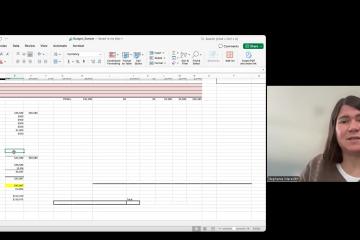For this month’s Medical Outreach Meeting, Dr. Stephanie Meredith presented on how to form and collaborate with a medical advisory team. Watch a recording of this meeting below and read on for a summary and helpful links!
How to Find Medical Advisory Team Members
Professionals that may be helpful to have on your medical advisory team include pediatricians, OB/GYNs, nurses, genetic counselors, geneticists, clinical social workers, lactation consultants, and NICU support staff. Many advocacy organizations have found medical advisory team members through “snowball sampling” – asking one interested professional if they know anyone else who may be interested, and so forth.
Dr. Meredith’s advice: Be brave! Your ask is often just the opportunity providers are looking for to make a greater difference (for example, everyone Dr. Meredith asked to join the Lettercase Review Committee this year said yes!).
Places to look for team members include:
- Professionals already working with your organization, such as volunteers, medical professionals who refer families to you, clinics who request your materials, etc.
- If you see repeated requests for materials from a certain area or group, reach out to them to find out who has been placing these requests!
- Local hospitals with the highest number of NICU workers
- Providers at local Down syndrome clinics
- Providers you have worked with on current or past projects, conference presentations, consensus groups, etc.
- Medical residents, who may be particularly motivated to work on extra projects and present at conferences
- Genetic counseling program directors, represented by the Genetic Counselor Educators Association (GCEA)
- OB/GYN students through OB/GYN student interest groups
- Other Down syndrome advocacy professionals (like Dr. Meredith!) to see if they have any connections with providers in your locals area
- Professionals whose work you admire – reach out to share what you appreciate about their work and ask if they would like to be involved in your organization
Ways to Collaborate With Your Medical Advisory Team
A medical advisory team can provide valuable guidance for your outreach, research, and advocacy efforts. For example, a medical advisory team might:
- Answer questions and provide insight, recommendations, and feedback on your organization’s progress and goals
- Collaborate with you on presentations or panels at conferences
- Create and review curricula and educational materials for medical providers/students
- Write and review publications or responses to new publications
- Write newsletter articles for medical providers, such as those in the Down Syndrome Association of Central Ohio (DSACO) newsletter
- Provide guidance on developing specialty-specific continuing education
- Bring your resources to conferences/grand rounds where they are presenting
National Conferences
Reserving a table at a conference near you is a great way to share resources and meet medical providers. You can also reach out to organizations/providers local to where a conference is being held to see if they would be interested in sharing your resources there.
This year’s national conferences include:
| Conference | Location | Date |
| Down Syndrome Affiliates in Action (DSAIA) | Albuquerque, NM | 2/20-2/22 |
| Association of Maternal & Child Health Programs (AMCHP) | Washington, DC | 3/15-3/18 |
| American College of Medical Genetics and Genomics (ACMG) | Los Angeles, CA | 3/18-3/22 |
| Patient-Centered Laboratory Utilization Guidance Services (PLUGS) | Seattle, WA | 4/2-4/4 |
| International Conference on Communication in Healthcare (ICCH) | Ottawa, Canada | 10/5-10/8 |
| American Society of Human Genetics (ASHG) | Boston, MA | 10/14-10/18 |
| American Society for Bioethics and Humanities (ASHB) | Portland, OR | 10/22-10/25 |
| International Conference on Prenatal Diagnosis and Therapy (ISPD) | Cape Town, South Africa | 10/30-11/2 |
| National Society of Genetic Counselors (NSGC) | Seattle, WA | 11/7-11/10 |


